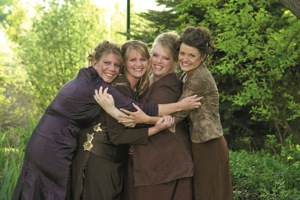
At the risk of losing my gay card, I’ll admit I don’t really like reality TV. More annoying is when reality TV invades reality, as when the cast of The Learning Channel’s Sister Wives sued the state of Utah over its anti-polygamy laws. Thanks largely to right-wing talking heads, TV polygamists have entered the marriage equality debate.
Despite what the pundits say, this is not the legal case the LGBT rights movement fears most or an imminent threat to marriage equality. The Sister Wives case, and polygamy in general, is only relevant to LGBT rights in two ways; as part of a slippery slope to those looking for an avalanche and as a distraction from the true stakes of the equality movement.
The slippery slope argument is not new. If same-sex marriage is legalized, social conservatives warn, polygamy is next, allegedly followed in no consensus order by weddings with pets, minors and plants. Once “traditional marriage” is altered in any way, society slides frictionlessly toward the abyss.
This slippery slope argument comes from sloppy assumptions about traditional marriage and legal maneuvering. In reality, there is no global, historical, definition of “traditional marriage”. At different times, in different cultures, marriage has involved love, property, harems and men on the side. In America, though, it’s largely been a civil contract between no more or less than two adults. Over time, American marriage has become more about love between equals, but at its heart, it remains about the state recognizing two adults choosing to spend their lives together.
Invoking the constitutional rights to equal protection and privacy, proponents of same-sex marriage argue that any two people should have the right to marry, regardless of gender. Kody Brown and the sister wives feel that laws against polygamy involve government intrusion into the activities of consenting adults, so it is not surprising that they also highlight the right to privacy. The use of similar legal arguments, however, does not prove causality. Advocates of both the right to bear arms and marriage equality use the 14th Amendment to suggest that any federal protections should be enforceable in all states. Yet no one argues that dismantling gun control laws will lead to same-sex marriage.
The simple fact is that same-sex marriage involves two people, and polygamy involves more. A state recognizing same-sex marriage needs to change its license from naming the “Bride and Groom” to denoting “Spouse 1 and Spouse 2”. Other state laws regarding spousal privileges apply almost automatically. Recognizing polygamy would be a bit more complex. Yes, two of the three or more people in the union would be of the same sex. Legal same-sex marriage may help that issue, but there are plenty of others? Which spouse makes medical decisions? How is inheritance split? How many of the partners need to agree to a divorce? Who gets the kids? Those questions nicely halt the slippery slope from same-sex unions to polygamy.
Lawsuits regarding polygamy don’t threaten the LGBT movement. Even if they did, the slope that leads to tree weddings should be less worrisome than the one that starts with second class citizens. For minority rights, reality TV becoming reality is far less scary than history repeating itself.











“In reality, there is no global, historical, definition of “traditional marriage”.
Bull. The US Supreme Court defined traditional marriage in a case almost 100 years ago. Look it up. Its called Murphy v. Ramsey, and was decided when Utah was a territory, thus making it a FEDERAL definition.
Clearly, same-sex marriage does not “cause” polygamy. There are places in the world that accept polygamy but not same-sex relationships, for example. Ultimately, an adult should be free to share love, sex, residence, and marriage with ANY consenting adults.